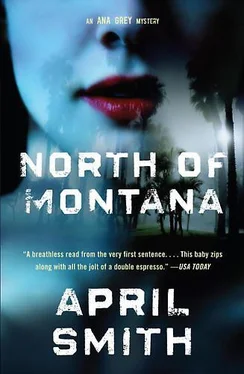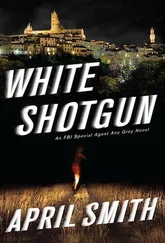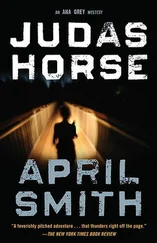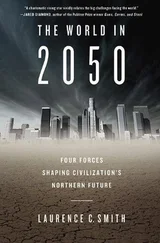He gets up and swaggers toward me as the others whistle and hoot, challenging him. I don’t like the building sense of dare and the ear-piercing mix of technopop and video chirp is making me nuts.
“Do me a favor, take off the shades.”
“What’s the problem?”
“I want to see if you’re straight.”
Tough guy: “I’m straight.”
He removes the glasses, revealing himself to be about twelve years old.
“It’s very important that you tell me exactly what happened to Mrs. Gutiérrez and the children.”
“Nothing happened. We live across the hall, she’s friendly with my mom. One day she says she’s going to El Salvador because she’s taking some kids back to their parents or something—”
“To the grandmother?”
“Yeah, the grandmother. So we got the apartment and all the stuff in it for a hundred bucks.”
The volcano paintings are still on the walls. The card table with its display of beer bottles intact. Teresa and Cristóbal are gone, erased.
I notice the laminated picture of El Niño de Atocha in the kitchen leaning up against the yellow tiles.
“She left that, too?”
“I guess.”
“You want it?”
He shrugs. I take the picture and two stumps of votive candles.
“Keep the music down.”
• • •
From the apartment house it is a two-block walk past dark empty lots and wrecked cars abandoned along the curb.
The corner of Santa Monica Boulevard comes to life from the crime scene photos: a major street, a bus stop with a blue bench, a low building with bricked-in windows that turns out to be a recording studio. A few steps away a mini-mall with fast-food chicken, pizza, dry cleaners, and a huge flamingo-pink music store is jammed with vehicles waiting for parking spaces. Rush-hour traffic on the main streets is moving slowly, an unctuous flow of yellow headlights.
If I looked hard enough, I could find the bullet holes in the bench and even in the masonry wall, but I don’t have the taste for it. I’ve been told Violeta was a religious person. Here is the congregation: young male runaways leaning into car windows hustling fifteen-dollar blow jobs. Here is the priest: a homeless schizophrenic wearing a child’s baseball jacket that comes down to his elbows shuffling along, pointing fastidiously to every square in the sidewalk. Here are the stained-glass windows: broken vials of crack glittering under orange street lamps. And instead of incense we are blessed with the profanity of car exhaust.
Yet, I prop up the plastic picture of El Niño de Atocha on the sill of one of the bricked-in windows and ask him, the guardian of lakes, to bless this unlikely place where someone has drowned. I set down the candle stubs, memorials to Violeta and my father, ghosts whom I will never really know. Despite the horns and the roar of traffic like a jetway and pedestrians on every side, I close my eyes and stand there and actually pray to El Niño to keep watch over those who are lost. I pray that Teresa and Cristóbal will walk on a black sand beach where the warm water will be full of red snapper and shrimp, and that when they reach the clearing in the bush they will find an older brother who is kind and a loving grandmother waiting with open arms.
Violeta’s Bible has been bumping around in my glove compartment. I finally lay it to rest on the window ledge.
A tight bitter sadness stays in my throat all the way home. When I get back to the apartment, I find Donnato’s card wedged in the door. “Call me,” he’s written.
I don’t.
• • •
Six days later the transfer to Kidnapping and Extortion comes through. Even though I know most of the guys on the squad, the first morning is tense. There are new procedures, a slew of paperwork, a different schedule, and of course a whole new section of the law to memorize.
My desk is moved to the other side of the bullpen and I say goodbye to the Bank Dick’s Undercover Disguise. There’s no room in the new location, so I leave it on the rack, inscribing my addition in ballpoint pen to the timeworn layers of advice: “Always make backup disks.”
My first case on C-1 involves an attempt by a disgruntled employee to hold the owner of a stationery store in a garage for ransom. He escaped and ran to the house of a neighbor who called the police. The suspect is now in custody. Being low man on the totem pole, my assignment is to go back to the neighbor, who has already been interviewed twice, and verify certain facts in his statement.
The abduction took place on Sixth Street, just off La Brea. This time of day the straightest shot would be Santa Monica Boulevard, which is how I come to be passing that corner once again.
What I see causes me to veer out of traffic and park in the middle of the bus stop.
It is the stop for the same bus Violeta would have taken to work on the Westside, the one she stepped off that night, the Number 4.
Maybe she crocheted along the way, maybe she dozed — past McDonald’s, Crown Books, Lou’s Quickie Grill, the crimson Formosa Café, the Pussycat Theater at Genessee, the Jewish bakeries in the Fairfax district — but Violeta Alvarado always got on the Number 4 at the same place and got off the Number 4 at the same place and was unchanged by the journey. She wasn’t part of the scramble. She knew who she was. She had come to America, that was her journey, and it ended here, at an intersection of dead roads, surrounded by a group of leering stoned-out creeps — misfits, night people, the forgotten, the invisible, the diseased, the disenfranchised, the damaged beyond help — at the coldest hour, just before dawn.
I know that hour of the night and I know that crossroads. I believe I have spent most of my life in that time and place, surrounded by spectres, deathly cold. The difference between us is Violeta carried hope like a simple charm, it was given to her the day she was born on a petate mat in the jungle, a birthright as uncomplicated as sun glancing off the leaf of a bamboo tree, and now, in the light of just such an ordinary, evanescent event, that gift has been shown to me.
I get out of the car and walk slowly, wonderingly, across the sidewalk. The haunted are gone, or at least absorbed by the larger numbers of those who are getting on with business, despite the odds. Drawing closer I see that what I’d glimpsed from the road is real: the picture of El Niño de Atocha is still standing, and furthermore, the windowsill is full of amazing objects. People have left flowers, toy cars, candies, and coins. The Bible is there, untouched. Nobody has stolen from El Niño.
In the shelter of the ledge other candles have been added: good luck candles printed with pictures of saints as I saw in the botánica , a fat red and green one left over from Christmas, a ragtag collection of half-burned tapers standing in juice cartons or anchored in crumpled bits of aluminum foil. All are lit. Someone has kept them lit. For the first time I can feel my mother and father inside me together, then rising together from this tender company of flames; rising up.
I don’t know how long I stand there before going back to the car and picking up the radio.
“This is signal 345. Do you have signal 587 in service?”
Dispatch: “Yes, we do.”
I give my location. “Could you ask him to respond?”
“Is it an emergency?”
“Not an emergency. Just a miracle.”
I lean against the G-ride until Donnato pulls up ten minutes later, bubble flashing, swerving to a halt and further blocking the bus stop.
He throws the door open and hurries toward me with a worried look. I reach for his hand, in front of that doofball Joe Positano, and everybody.
The author wishes to express particular gratitude to Sonny Mehta for his commitment, as a publisher, to the vision of the writer. Warm thanks also to Sarah Burnes for her insights and for staying on the case, and to Molly Friedrich, whose unstoppable enthusiasm for the manuscript made everything possible. Boz Graham of CAA and Walter Teller of Hansen, Jacobson, Teller, and Hoberman provided expert advice, and the keen editorial talent of Sandi Gelles-Cole was essential throughout.
Читать дальше












